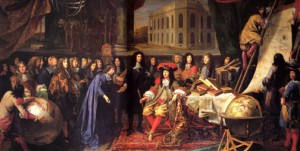Cartesian Empiricisms – a Reply
Peter Anstey writes …
The forthcoming book Cartesian Empiricisms edited by Mihnea Dobre and Tammy Nyden promises to extend our knowledge of the experimental practices and philosophy of experiment amongst many of Descartes’ followers.
Dobre, however, claims that the book will offer more than a study of these writers. He says in his recent post that what we find in these neo-Cartesians ‘seems to escape the ESD’ (experimental–speculative distinction, my italics). In what sense might it be true that Cartesians doing experiments might escape the ESD? Is it that the ESD cannot explain them? Or, more strongly, is it that their experimental practices contradict the central tenets of the actors’ categories of experimental philosophy and speculative philosophy? And what is the value of persisting with the term ‘empiricism’ to describe the neo-Cartesians’ engagement with experiment?
In my view, the fact that some Cartesians performed experiments is of great interest, but it is also grist for our mill: it actually enriches the evidential base for the claims that we have made on this blog and in recent publications. For it shows that, like all other speculative systems, Cartesian natural philosophy was also subject to the court of experiment.
We have never claimed that proponents of speculative systems like Cartesianism were necessarily opposed to experimental verification of their theories. Nor have we ever claimed that all experimental philosophers were adamantly opposed to speculation: some were, but others, like Robert Boyle and Robert Hooke, were not.
We have claimed that the Cartesian vortex theory came to be regarded by many as the archetypal speculative theory in natural philosophy. Indeed, this was the virtually the standard view in England from the late 1690s when the term ‘our vortex’ starts to disappear and Newton’s arguments against the Cartesian system began to be widely appreciated. But none of this implies that our claims about the ESD need somehow to be modified. In fact, there is evidence that distaste for speculative system building and a belief in the need for the construction of Baconian natural histories were constituents of the general methodological background to mid-seventeenth-century Parisian natural philosophy. The first article of the constitution of the Montmor academy, which met in Paris from the mid-1650s to around the time of the formation of the Académie des Sciences, says:
The purpose of the company shall not be the vain exercise of the mind on useless subtleties (subtiltés inutiles), but the company shall set before itself always the clearer knowledge of the works of God, and the improvement of the conveniences of life, in the Arts and Sciences which seek to establish them.
The anti-speculative element here is hard to miss. (Interestingly, none of the articles mention experiment.) Furthermore, it is well known that Christiaan Huygens recommended to Colbert that the newly formed Adadémie construct natural histories after the manner of Verulam.
What I am hoping to glean from Cartesian Empiricisms is an answer to the following question:
Did the Cartesians practise a form of experimental philosophy analogous to that of the Fellows of the early Royal Society?
This question is important for a number of reasons. The work of Trevor McClaughlin on Rohault, for example, has shown that early Cartesians carried out experiments. Yet we still lack a detailed assessment of the nature, theory and practice of experiments amongst the neo-Cartesians in the three decades after Descartes’ death. There is no doubt that they performed experiments for illustrative purposes and repeated many classic experiments for pedagogical purposes. But did they engage in experimental programs with a view to acquiring new knowledge of nature and to modifying and developing natural philosophical knowledge?
What makes this issue particularly pressing is that there is evidence from the late 1650s and early 1660s that the natural philosophers who met in the Parisian academies, such as the Montmor academy which included several prominent Cartesians, performed experiments, but were not really practising experimental natural philosophy. Henry Oldenburg reported to Michaelis in April 1659 that the philosophical academies in Paris: ‘are rich in promises, few in performance’ (Corresp. of Oldenburg, 1: 241). Three months later Oldenburg wrote to Boyle from Paris saying:
we have severall meetings here of philosophers and statists which I carry your nevew to, for to study men as well as books; though the French naturalists are more discursive, than active or experimentall. (Corresp. of Oldenburg, 1: 287)
My hope, therefore, is that Cartesian Empiricisms will answer this very pressing question.


